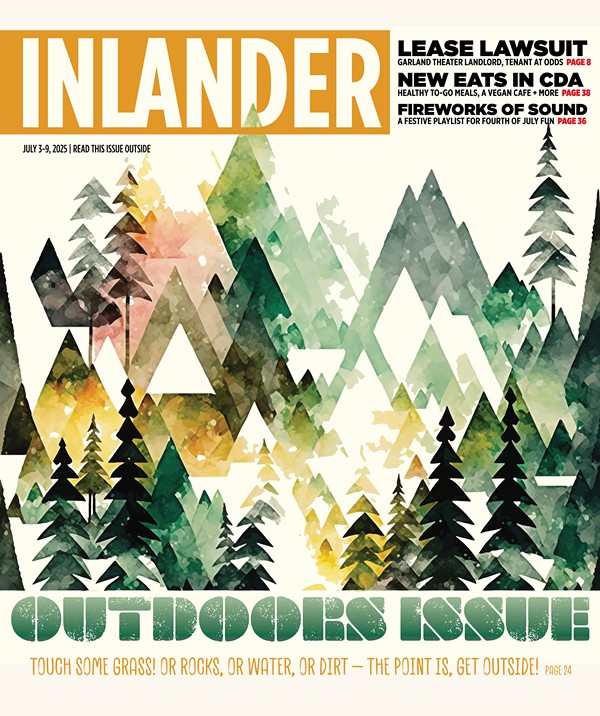Ron Brown doesn't talk like he's a defiant last man standing.
On a windy Friday morning, he's looking across the parking lot of Brown Building Materials, the construction supply company his family has owned since 1959, pointing to the chalk lines marking the triangle-shaped chunk of the lot that the city of Spokane has tried to persuade him to sell.
Now, the city is forcing the issue.
That chunk — just 3,100 square feet — is the final piece of land the city needs to complete the long-anticipated Martin Luther King Jr. Way, creating a crucial thoroughfare for the University District and connecting downtown Spokane with the east side. More than $12 million in state and federal grants has been earmarked for the project, and some of that funding could be lost if the city doesn't hurry up.
The city has managed to get agreements from 11 other property owners. But despite more than two years of attempts at negotiation, Brown's piece of property, situated on Erie Street at the end of the MLK route, represents the final roadblock.
He says he's concerned about the impact of losing a piece of his parking lot, and one of the two entrances to his facility. He's concerned it could impact semi-truck traffic entering and exiting his lot.
Yet he doesn't speak about the situation in apocalyptic or angry terms. He's open about the fact that, really, he's not quite sure how much the loss would harm his business.
"I want someone who can analyze it better than I can," Brown says. "I want an engineer to look at it."
Last week, however, the city council voted, 5-2, to unholster a rarely used weapon, forcing Brown to sell that part of his property. The city has the power of eminent domain, condemning a property to force a sale, as long as they can prove it's in the public interest.
Brown isn't angry about that either. He's hired Bob Dunn — an attorney famous for suing the city and winning big — to represent him. He suggests that eminent domain, and the jury verdict that might follow, is his best shot at getting a fair deal.
"I think it's working the way it should. If you can't come to an agreement, there is a process," Brown says. "I believe in our system."

LAST RESORT?
Eminent domain wasn't the council's first choice, City Council President Ben Stuckart says, but its last. He says the council urged the city staff to keep trying to negotiate until they couldn't try anymore.
"We're already tagged, because of things like the [mandatory sick leave policy], as the anti-business council," Stuckart says. "That's why it took so long. None of us wanted to do this."
Eminent domain is the same tool that GOP presidential candidate Donald Trump attempted to use, unsuccessfully, to force an old lady to sell him her home in order to expand the parking lot for one of his casinos.
It's also a tool crucial for governments to complete highways and public projects. Spokane has used it before. More than a century ago, the city used the tool to force the sale of a property at Wall Street and Spokane Falls Boulevard, and converted the building into City Hall. The city has used it a handful of times since, including for the Havana Street bridge project and for the parking lot that, years later, became the Davenport Grand Hotel.
It's been a dozen years since the city received state and federal grants earmarked for MLK Way, and city staff have suggested that some of that funding could evaporate if the project is not completed by the end of 2017.
"If we want a road to nowhere, we will do nothing," Stuckart said last week from the council dais. "But I believe we need to act."
City spokeswoman Marlene Feist, however, says the city hasn't been given a hard and fast deadline. Still, she says that federal funders have been pushing for "specific plans to get the money spent quickly" in order to keep their grants.
In his council comments, Stuckart laid the blame at the feet of Brown, suggesting that what he was asking was unreasonable.
"When you're offering someone $35,000, and their negotiation wants over $1 million, I don't think that's what the citizens want us to be buckling to," Stuckart says.
But Brown insists that he never named a price for a counteroffer, $1 million or otherwise. Instead, his desire was far more general.
"They asked me what I wanted, and I told them that, everything considered, I'd sooner move," Brown says. The estimate of more than $1 million is the city's calculation, taking into account the price for the city to purchase the entire property and help Brown with relocation.
"Take a look at the building," Brown says. "I wouldn't have built that building where it is, if the new road was here when I built it."
Kyle Twohig, director of engineering services for the city of Spokane, told the council that Brown has been offered a number of concessions to ease the impact of the project on his property, including stormwater facilities, driveway modifications and three times the number of parking spaces.
Councilman Mike Fagan decided to investigate the issue the old-fashioned way; he walked into Brown's business two weeks ago to talk face-to-face.
"He just showed up one day," Brown says. "He just wanted to know my side of it."
During their two visits, Fagan concluded that Brown hadn't been made fully aware of some of the city's offers on the table, including a land swap deal that would have included a new road to the back of his property. He says he even offered to delay the vote so Brown could further consider the option, but says that Brown indicated he wasn't interested.
Fagan suggests that the route could have been moved slightly, or the type of road changed, to avoid Brown's property.
"We did have an alternative we could have explored," Fagan says.
But speaking to the council, Twohig says those ideas had been considered and rejected.
"All of the alternatives won't really serve the intended public use as an arterial and an oversized truck route," Twohig said. Not only that, but changing the project would require more negotiations with other property owners.
Fagan wasn't convinced.
"[Eminent domain] should always be the last resort, when all other alternatives have been exhausted," he says. "In this case, I got a clear indication that they weren't."
He voted to oppose the city's use of eminent domain. Candace Mumm — a liberal-leaning councilwoman competing with two Republicans in this year's county commissioner race — joined Fagan in his opposition, citing similar concerns.
"I wasn't comfortable with it. I'm not a big fan of eminent domain," Mumm says. "It seems like something that should have been worked out a long time ago."
The Inlander requested an interview with city staff to further investigate which offers had been made, and when they'd been rejected. But the moment the council voted to approve the use of eminent domain, it suddenly became a matter of pending litigation, and the city was unwilling to speak about it with the media.
Brown is similarly wary of getting too deep into detail.
"We've been talking," Brown says. "But the last thing I've seen says 'Confidential,' so I probably shouldn't talk about it."
MYSTERY PRICE TAG
Armed with the power to force a sale via eminent domain, it may seem like the city has the upper hand over Brown. But when it comes to the sale price itself, Spokane could be at the whims of a jury. That often doesn't work out in the city's favor.
Back in the '90s, the city moved to use eminent domain during a three-year legal battle to force a sale of a property north of the downtown library. Steve and Leslie Ronald wanted to build a seven-story riverfront condo on the property, while the city wanted to preserve the view of the falls.
The tactic backfired, and a jury awarded the Ronalds the full $2.18 million they requested — orders of magnitude greater than the city argued the property was worth. It left councilmembers back then scrambling to figure out if they actually even wanted the property at that price after all.
Dunn has been down this road plenty of times before. When he faced off against the state in an eminent domain case in 1996, the jury delivered the property owners $3.5 million, nearly 90 times what the state had originally offered.
"I don't remember the last time a jury did not award a number far in excess that the county or state or city has been insisting on," Dunn says. "Everybody understands being paid a fair price for what you own."
He's been involved in other cases, too, where the jury found that taking one small piece of property impacted the rest.
"They're not taking much of his property? They're just taking his entrance," Dunn says. "That's like saying you're only going to take a little bit of your body — we're going to take your heart, we're going to leave the other 90 percent."
A long, costly trial isn't guaranteed. Both Brown and the city will continue to negotiate. And Dunn knows that the pressure the feds are applying on the city to finish the project quickly gives him extra negotiating power.
"This certainly could settle," Dunn says. "I think it boils down to money. All of these eminent domain cases I get involved in center on the issues of money." ♦
























